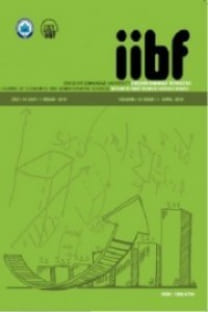Gelişmekte Olan Ülkelerde Küreselleşmenin Yoksulluk ve Gelir Eşitsizliği Üzerindeki Etkileri
Bu çalışmanın amacı gelişmekte olan ülkelerde küreselleşme, yoksulluk ve gelir eşitsizliği arasındaki ilişkiyi araştırmaktır. Çalışmada sadece küreselleşmenin değil aynı zamanda, küreselleşmenin alt bileşenleri olan ekonomik, sosyal ve politik küreselleşmenin yoksulluk ve gelir eşitsizliği üzerindeki etkileri de dikkate alınacaktır. Çalışma 102 gelişmekte olan ülkenin 2010 yılı verileri kullanılarak yatay kesit analizi ile test edilecektir. Ampirik bulgularımıza göre küreselleşme yoksulluk ve gelir eşitsizliği azaltmaktadır. Bu sonuçlar küreselleşmenin alt bileşenlerinin etkilerinin analiz edildiği modellerle de desteklenmektedir. Sonuç olarak gelişmekte olan ülkelerde ekonomik, politik ve sosyal küreselleşme hem yoksulluğu hem de gelir eşitsizliğini azaltmaktadır..
Anahtar Kelimeler:
Küreselleşme, Yoksulluk, Gelir Eşitsizliği, Yatay Kesit Analizi, Gelişmekte Olan Ülkeler
The Effects of Globalization on Poverty and Income Inequality in Developing Countries
The aim of this study investigates the relationship between globalization, poverty and income inequality in developing countries. Within this context not only globalization but also the subcomponents of globalization such as the economic, social and political effects of globalization on poverty and income inequality are considered. This study tests 102 developing countries with data for the year 2010 by using crosssectional analysis. As empirical findings indicate, globalization reduces poverty and income inequality. These results are also supported by models for analyzing the effects of the subcomponents of globalization. As a result, the economic, political and social globalization reduces poverty and income inequality in developing countries.
___
- Adams Jr, R.H. ve J. Page (2005), “Do International Migration And Remittances Reduce Poverty in Developing Countries?” World Development, Vol. 33, No.10, pp. 1645-1699.
- Agénor, P. R. (2003), “Does Globalization Hurt the Poor?”, World Bank Policy Research Working Paper, 2003:2922, http://elibrary.worldbank.org/content/workingpaper/10.1596/1813-9450-2922 (Erişim:05.03.2012).
- Ağır, H. ve M. Kar (2010), “Türkiye’de Elektrik Tüketimi ve Ekonomik Gelişmişlik Düzeyi İlişkisi: Yatay Kesit Analizi”, Sosyoekonomi, 2010EN, Özel Sayı, ss.149-175.
- Aktan, C. C. (2002), “Yoksulluk: Terminoloji, Temel Kavramlar Ve Ölçüm Yöntemleri”, Ed: C.Can Aktan, Yoksullukla Mücadele Stratejileri, Hak-İş Konfederasyonu Yayınları, Ankara.
- Arestis, P. ve A. Caner (2009), “Financial Liberalization And The Geography Of Poverty” Cambridge Journal of Regions, Economy and Society, Vol. 2, No. 2, pp. 2292
- Bannister G. J. ve K. Thugge (2001), “International Trade and Poverty Alleviation” IMF Working Papers, WP/01/54, http://www.imf.org/external/pubs/ft/wp/2001/wp0154.pdf (Erişim: 07.07.2013)
- Bardhan, P. (2005), “Globalization and Rural Poverty”, WIDER Research Paper No. 2005/30, http://www.wider.unu.edu/stc/repec/pdfs/rp2005/rp2005-30.pdf, (Erişim: 10.08.2010.)
- Blalock G. ve P. Gertler (2008), “Welfare Gains From Foreign Direct Investment Through Technology Transfer to Local Suppliers”, Journal of International Economics, Vol:74, No. 2, pp. 402-421.
- Bourguignon, F. (2003), “The Growth Elasticity of Poverty Reduction: Explaining Heterogeneity across Countries and Time Periods,” Erişim: http://siteresources.worldbank.org/INTPGI/Resources/3426741206111890151/13565_32322_growth_elasticity.pdf (Erişim: 07.07.2013).
- Caner, A. (2007). "Finansal Serbestleşme ve Yoksulluk İlişkisi Üzerine," Iktisat Isletme ve Finans, Vol. 22, No. 254, ss. 5-17.
- Collier, P. ve D. Dollar (2001), “Can The World Cut Poverty in Half? How Policy Reform And Effective Aid Can Meet International Development Goals”, World Development Vol: 29, pp. 1787-1802.
- Culpeper, R. (2002), “Approaches to Globalisation and Inequality within the International System”, Paper prepared for UNRISD Project on Improving Knowledge on
- ISSN: 1306-6730
- Yayın Aralığı: Yılda 3 Sayı
- Başlangıç: 2006
- Yayıncı: Eskişehir Osmangazi Üniversitesi İktisadi ve İdari Bilimler Fakültesi
Sayıdaki Diğer Makaleler
Ülkelerarası Büyüme Farklılıklarının Açıklanmasında Kurumsal Yapının Rolü: Panel Veri Analizi
Seyfettin ARTAN, Pınar HAYALOĞLU
Türkiye'de Phillips Eğrisi Üzerine Bir Uygulama
Osman Cenk KANCA, Metin BAYRAK
Avrupa Birliği Yönetiminde Belgelere Erişim Hakkının Gelişimi
Firma Değerlemesinde İndirgenmiş Nakit Akımları Yöntemi: BIST Elektrik Endeksinde Bir Uygulama
Gelişmekte Olan Ülkelerde Küreselleşmenin Yoksulluk ve Gelir Eşitsizliği Üzerindeki Etkileri
Semih OKUTAN, Buket BORA, Remzi ALTUNIŞIK
Satın Alma Gücü Paritesinin Geçerliliğinin Test Edilmesi: Zaman Serisi ve Panel Veri Analizi
Kemal YILDIRIM, Mehmet MERCAN, S. Fatih KOSTAKOĞLU
Türkiye’de Phillips Eğrisi Üzerine Bir Uygulama
